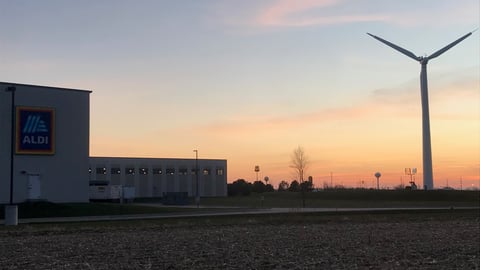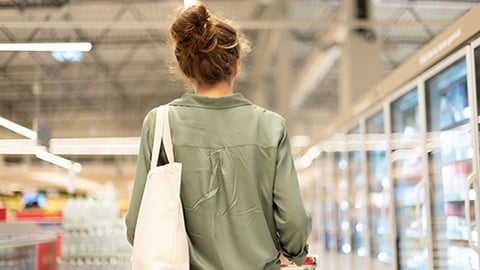Aldi Unveils New Sustainability Charter
Aldi has taken the wraps off a new sustainability charter that commits the discount retailer to various initiatives with goals to be achieved between now and 2030. The company has revealed commitments to lower greenhouse gases, reduce food and operational waste, improve packaging and source responsibly, all with the aim of positively affecting the environment as it continues to provide customers with accessible and affordable choices.
“Aldi has a responsibility to protect the environment, and we know it’s an important priority for our customers,” said Jason Hart, CEO of Batavia, Illinois-based Aldi U.S. “We are committed to evaluating and implementing sustainable business practices while always offering the highest-quality products at prices that can’t be beat.”
The sustainability charter includes the following initiatives:
Lower greenhouse gas emissions by 26% by 2025 through a continued transition to solar and wind energy sourcing and by building out renewable infrastructure to rely less on grey power grids. Aldi currently has solar panels at 111 stores and 12 distribution centers across the United States, and will install solar panels at warehouses in Alabama and Kansas, as well as at around 60 stores by the end of 2022. The retailer currently purchases enough renewable energy annually to power its more than 2,000 stores, 25 warehouses and offices, sourcing this power through Green-e and receiving renewable energy certificates to validate its clean-energy investment. All Aldi U.S. warehouses and almost 400 stores employ natural refrigerants that lower the environmental impact by up to 4,000 times compared with common refrigerants. The grocer will continue to transition to natural refrigerants in all store locations.
Divert 90% of operational waste by 2025 and work to lower food waste by 50% by 2030. Plans to reach these goals, now in development, are expected to encompass composting, nonfood donation programs and expanded recycling and food recovery initiatives. Aldi already diverts waste from store and warehouse operations and has launched recycling efforts for food, plastic film, corrugated cardboard, paper, metals and other materials.
Reduce packaging materials by 15% and convert all Aldi-exclusive packaging to reusable, recyclable or compostable materials by 2025. By the end of 2021, Styrofoam will be removed from all produce packaging at the company, and Aldi will continue to work toward packaging commitments it made in 2019 to reduce packaging and to make 100% of Aldi-exclusive packaging — including plastic packaging — reusable, recyclable or compostable by 2025. So far, the retailer has redesigned packaging to remove or reduce excess plastic from products such as teas and bread. In some of its stores, Aldi is also introducing alternative packaging for perishables such as blueberries and tomatoes, which uses 20% less plastic than traditional containers, as well as for mixed bell peppers, which uses 44% less plastic. Further, the grocer is labeling products to encourage recycling at home, using cardboard sleeves for more than 90% of its apparel items, and testing recyclable and compostable paper bags for apples in certain stores, along with a new initiative to remove all multi-use plastic bags from six Richmond, Virginia-area stores. Aldi has never offered single-use plastic bags and sells only reusable plastic and cloth bags, a policy that it estimates has kept more than 15 billion bags out of landfills and oceans.
“The global impact of plastics can’t be ignored,” said Hart. “We can’t get rid of plastic everywhere overnight, but we continue to work to eliminate plastics anywhere we can. Where we do need plastic, we are committed to choosing materials that contribute to a circular plastic economy.”
Expand sustainable sourcing of coffee, while continuing to source cocoa and seafood sustainably. With its business partners, Aldi will promote human rights, boost supply chain transparency and ensure that products are designed and produced in an eco-friendly way. More than 40 of the company’s coffee products are currently certified as sustainable, and Aldi is the second-largest private label purchaser of Fair Trade USA coffee. In addition, all of its Barissimo and Simply Nature coffees will be certified as sustainably sourced by the end of next year. All Aldi exclusive-brand chocolate bars and chocolate confectionary are certified as sustainably sourced by Fairtrade, Fair Trade USA or Rainforest Alliance, while all Aldi-exclusive brand fresh, frozen and canned seafood is sourced from responsible fisheries and farms, and 100 of its seafood products are certified as sustainably sourced by a third party. The retailer has taken an additional step towards seafood sustainability by making the origin of wild-caught seafood transparent and available to the public via the Ocean Disclosure Project.
Other retailers to up their game in this area include Ahold Delhaize USA, which recently released new health and sustainability goals as part of its strategy to develop a more sustainable food supply chain.
With more than 2,000 stores across 37 states, Aldi U.S. is No. 26 on The PG 100, Progressive Grocer’s 2020 list of the top food retailers in North America. The retailer is on track to become the third-largest grocery retailer by store count by the end of 2022. Ahold Delhaize USA, a division of Zaandam, Netherlands-based Ahold Delhaize, is the parent company for Ahold Delhaize’s U.S. companies, consisting of Food Lion, Giant Food, The Giant Co., Hannaford, and Stop & Shop, as well as e-grocer Peapod; Retail Business Services, a U.S. support services company providing services to the brands; and Peapod Digital Labs, its e-commerce engine. Operating more than 2,000 stores across more than 20 states, Ahold Delhaize USA is No. 11 on The PG 100.






